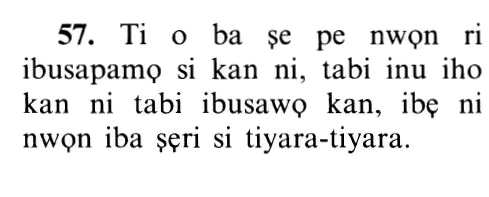9vs57
Select any filter and click on Go! to see results
لَوْ يَجِدُونَ مَلْجَأً أَوْ مَغَارَاتٍ أَوْ مُدَّخَلاً لَّوَلَّوْاْ إِلَيْهِ وَهُمْ يَجْمَحُونَ
Law yajidoona maljaan aw magharatin aw muddakhalan lawallaw ilayhi wahum yajmahoona
Index Terms
Click to play
Yoruba Translation

Hausa Translation
Dã sunã sãmun mafaka kõ kuwa waɗansu ɓulõli, kõ kuwa wani mashigi, da sun, jũya zuwa gare shi, kuma suna gaggawar shiga.
Asbabu n-Nuzuul (Occasions of Revelation)
لَوْ يَجِدُونَ مَلْجَأً ...
Should they find a refuge,
such as a fort in which they hide and fortify themselves,
... أَوْ مَغَارَاتٍ ...
or caves, (in some mountains),
... أَوْ مُدَّخَلاً ...
or a place of concealment,
According to the explanation given by Ibn Abbas, Mujahid and Qatadah,
a tunnel or a hole in the ground,
... لَّوَلَّوْاْ إِلَيْهِ وَهُمْ يَجْمَحُونَ ﴿٥٧﴾
they would turn straightway thereto with a swift rush.
away from you because they associate with you unwillingly, not because they are fond of you. They prefer that they do not have to mix with you, but necessity has its rules! It is because of this that they feel grief, sadness and sorrow, seeing Islam and its people enjoying ever more might, triumph and glory. Therefore, whatever pleases Muslims brings them grief, and this is why they prefer to disassociate themselves from the believers. Hence Allah's statement,
لَوْ يَجِدُونَ مَلْجَأً أَوْ مَغَارَاتٍ أَوْ مُدَّخَلاً لَّوَلَّوْاْ إِلَيْهِ وَهُمْ يَجْمَحُونَ
Should they find a refuge, or caves, or a place of concealment, they would turn straightway thereto with a swift rush.
" لو يجدون ملجأ " أي حصنا يتحصنون به وحرزا يتحرزون به " أو مغارات " وهي التي في الجبال " أو مدخلا " وهو السرب في الأرض والنفق قال ذلك في الثلاثة ابن عباس ومجاهد وقتادة " لولوا إليه وهم يجمحون " أي يسرعون في ذهابهم عنكم لأنهم إنما يخالطونكم كرها لا محبة وودوا أنهم لا يخالطونكم ولكن للضرورة أحكام ولهذا لا يزالون في هم وحزن وغم لأن الإسلام وأهله لا يزال في عز ونصر ورفعة فلهذا كلما سر المسلمون ساءهم ذلك فهم يودون أن لا يخالطوا المؤمنين ولهذا قال " لو يجدون ملجأ أو مغارات أو مدخلا لولوا إليه وهم يجمحون " .
"لو يجدون ملجأ" يلجئون إليه "أو مغارات" سراديب "أو مدخلا" موضعا يدخلونه "لولوا إليه وهم يجمحون" يسرعون في دخوله والانصراف عنكم إسراعا لا يرده شيء كالفرس الجموح
كذا الوقف عليه . وفي الخط بألفين : الأولى همزة , والثانية عوض من التنوين , وكذا رأيت جزءا . والملجأ الحصن , عن قتادة وغيره . ابن عباس : الحرز , وهما سواء . يقال : لجأت إليه لجأ ( بالتحريك ) وملجأ والتجأت إليه بمعنى . والموضع أيضا لجأ وملجأ . والتلجئة الإكراه . وألجأته إلى الشيء اضطررته إليه . وألجأت أمري إلى الله أسندته . وعمرو بن لجأ التميمي الشاعر عن الجوهري .
I'raab - grammatical analysis of the Qur'an
«لَوْ» حرف شرط غير جازم.
«يَجِدُونَ» فعل مضارع وفاعل.
«مَلْجَأً» مفعول به والجملة لا محل لها ابتدائية.
«أَوْ مَغاراتٍ» اسم معطوف منصوب وعلامة نصبه الكسرة لأنه جمع مؤنث سالم.
«أَوْ» عاطفة.
«مُدَّخَلًا» اسم معطوف.
«لَوَلَّوْا» فعل ماض وفاعله واللام واقعة في جواب الشرط ، والجملة لا محل لها جواب شرط غير جازم.
«إِلَيْهِ» متعلقان بالفعل.
«وَهُمْ» مبتدأ والواو حالية. وجملة «يَجْمَحُونَ» خبر المبتدأ والجملة الاسمية.
«وَهُمْ يَجْمَحُونَ» في محل نصب حال.
